Biogen has cut the price of Aduhelm, its would-be Alzheimer’s blockbuster, by 50% as it seeks to jumpstart a launch that’s been saddled in part by pushback on the treatment’s cost.
Biogen said Monday that the yearly price tag of the med is being lowered by roughly half – to $28,200 per patient from $56,000, the drug’s cost when it was approved by the Food and Drug Administration in June.
The company also announced that it plans a series of cost-reduction measures next year designed to save about $500 million, the details of which are being ironed out.
Since Aduhelm’s FDA approval six months ago and subsequent launch, most payers have decided not to cover the medication, at least for the time being. The lack of reimbursement has put the monthly infusion drug out of reach for many people on Medicare, the insurance program which covers most individuals likely to qualify for the drug.
“Too many patients are not being offered the choice of Aduhelm due to financial considerations and are thus progressing beyond the point of benefitting from the first treatment to address an underlying pathology of Alzheimer’s disease,” said Biogen CEO Michel Vounatsos.
Alzheimer’s Association, the patient group which had campaigned for insurers to provide access and for Biogen to lower Adulhelm’s price, acknowledged the cost cut as “an important step. It stressed, however, that “more needs to be done” in terms of coverage, according to a statement issued by its president, Joanne Pike, on Monday.
Biogen’s first hint that the launch wasn’t going smoothly came in July. Several insurers, including United Healthcare, pushed back very publicly. Sales were expected to ramp gradually as coverage was fleshed out. But in August, the Department of Veterans Affairs balked at paying for the therapy.
All cited the clinical data, which were inconclusive as to whether the drug confers any benefit to patients, as well as concerns about side effects. Some big medical centers also said that they wouldn’t offer the treatment to patients, citing the list price as a factor.
Policy experts warned that, at the original price, Aduhelm would inundate Medicare Part B with tens of billions in new spending. The sheer scale of spend and threat to the sustainability of the U.S. healthcare system became a controversy in and of itself.
Medicare is slated to decide soon whether to pay for Aduhelm, a ruling which Biogen said factored into its pricing move. Some patient groups are wondering what, if any, effect the price decrease will have on the Centers for Medicare and Medicaid Services’ deliberations.
“While CMS isn’t legally allowed to consider cost in making coverage determinations, many of us have questioned whether that would actually be the case,” George Vradenburg, chair and co-founder of the patient group UsAgainstAlzheimer’s in a statement Monday. “If cost was a factor, that issue should now be off the table.”
However, the new price, $28,200 per patent per year, is still well above that recommended by the influential Institute for Clinical and Economic Review (ICER). The organization has advised a price of between $2,500 and $8,000 a year per patient.
Medicare is slated to make a preliminary coverage decision in January, followed by a final one in April after a public comment period. Biogen said that, with insurance coverage and access to diagnostics, it hopes to start about 50,000 patients on the treatment in 2022.
Meanwhile, Aduhelm’s third-quarter revenue totaled just $300,000. Overall sales from other drugs came in largely flat or declining, with the biotech’s multiple sclerosis treatments under assault from generic competition.
Biogen said a significant portion of savings from its cost-cutting measures will be realized in 2022. The company didn’t say whether they will include layoffs, but details will be finalized in coming weeks and made public in the first quarter.
More recently, Aduhelm was hit with a rejection from regulators in Europe. The company is also preparing to begin a post-marketing trial that will take four years to read out.
Other drugmakers are seeking to take advantage of Aduhelm’s sluggish launch. Eli Lilly & Co.’s Alzheimer’s drug donanemab, for one, is under an accelerated approval process, which will include a Phase III study comparing the monoclonal antibody directly to Aduhelm.







